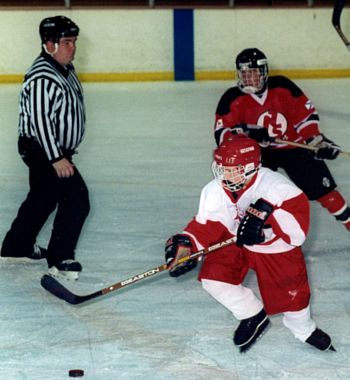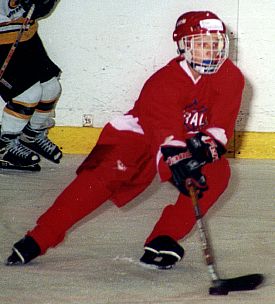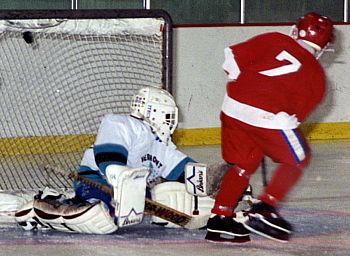Part III: Summer Hockey
Some denigrate summer hockey as a bad thing. Kids should get away from the rinks and play other sports and do other things, they argue. Burnout might ensue if a kid plays hockey 12 months out of the year.
I would agree if summer hockey entailed the grind of weekly practices and skill sessions. Burnout would become a significant concern.
Ryan’s form of summer hockey was quite different, however. He played for the New England Generals, Dave Brien’s summer team, which equated to one or two get-acquainted practices and six tournaments. This typically included the huge Ottawa tournament that coincided with Canada Day, two or three others in Ontario or Quebec, Uncle Sam’s in Troy, New York, and a couple local to the Boston area.
Kids had plenty of opportunity to play other sports and pursue other activities all summer long. Then, every three weeks or so, they’d travel to a tournament where they’d face top competition and stay at nice hotels, splashing away in the swimming pool and playing hockey in the hallways with foot-long souvenir sticks.
This wasn’t fodder for burnout. It was a blast for these kids, something that fed their love for hockey rather than drained it.
Summer hockey did require a substantial commitment from the rest of the family, however, one which many would not have undertaken.

It was expensive. My wife Brenda and I both had good jobs, but we were far from wealthy. At times, it seemed as if The Cynic’s Law of Finances — everyone spends 110 percent of whatever they earn — wasn’t just a wisecrack but instead reality. The tournament fees were more than reasonable, but the hotel bills could be killers.
Brenda and I, however, had long since agreed without even having to speak the words that we’d do whatever we could for our kids and if it meant eating Alpo in retirement or doing a lot of financial catching up once Ryan and Nicole were on their own, then so be it. It was an attitude that could have easily led to ruin, but we were fortunate in many respects and although the catching up is a reality that lies ahead of us, we’ll probably avoid eating Alpo.
The commitment to summer hockey, however, also meant that some percentage of family vacations would be spent at tournaments. Most ran from Friday through Sunday, requiring only a single day off from work. The massive Ottawa tournament, however, spanned seven days and six rinks. One year, we left Ottawa only to head directly to Nicole’s swim meet in St. John, New Brunswick, a drive of over 20 hours, where we spent several more days.
We always managed to add a vacation week on Cape Cod at a recreational facility owned by the company I worked for, but it was still a good thing that Ottawa, Toronto, Montreal and Quebec City were fun places to visit.
For Brenda and me, however, it still would have been fun even had the destinations been drab and lifeless. We valued our kids above all else and would do anything for them. She would drive Nicole to two-a-day swim practices, the first coming in the wee hours of the morning before school and the second coming after school. Brenda put up with Ryan practicing his stickhandling with a golf ball in the kitchen.
And I reacted with glee, rather than dismay, when Ryan took out the first of four garage door windows with a shot from the driveway that flew over the net. He’d never had the strength to lift a shot that high before. This was progress. You could always replace a broken window.
When parents couldn’t make it to a tournament, kids sometimes stayed with us. Not often, since we tried to maintain a family atmosphere to these trips, but it happened. After all, it wasn’t that much different from the frequent practice of staying over a teammate’s house between Saturday and Sunday games.
In one case, however, the vastly different values of two families hit me square between the eyes. A kid who I’ll call Joe came from a neighborhood whose mean streets were far different than our suburban environment.
At the beginning of our trip, we stopped at Dunkin’ Donuts. Ryan loved doughnuts. As a seven-year-old, he’d even considered them to be one of the more memorable highlights of the old Montreal Forum when we attended a game there. So I stood in line with a mile-long list of what to order while Joe walked to the refrigerator to get three bottles of orange juice.
When he returned, he stood next to me and covertly opened the flap of his coat enough for me to see the three bottles. He asked, “Are we paying for these?”
I blinked in astonishment, seconds passing before I replied. “Of course, we’re paying.”
He nodded and put the bottles on the counter.
A decade or so later, I bumped into someone who knew Joe and asked what had become of him.
“He doesn’t have a job, but he’s driving a new Lexus,” came the grim-faced reply. “Do the math.”
It makes you wonder. How different might Joe have been growing up in Ryan’s environment? And how different might Ryan have been growing up in Joe’s?
Dave Brien coached both the 1980 and the 1984 Generals, teams comprised of players born in those respective years. The ’80 Generals, often referred to by ’84 players and parents as The Big Generals, won tournament after tournament. Loaded with skill and toughness, they were a swashbuckling group that the ’84 Generals naturally looked up to. The Big Generals backed down from no one and had more than enough talent to make up for considerable time spent in the penalty box.

The Little Generals, however, were another story, at least when they were first formed. Summer AAA teams had become a popular commodity with several being formed from the Metro league. Those put together by the coaches of the more successful teams not only had a head start on in-house talent, they also had a much easier time attracting the other top players in the league.
As a result, our first trip to the marquee event of the summer, the Ottawa Capitals tournament, wasn’t exactly a resounding success. While the ’80 Generals rocked and rolled their way into the championship round with most of the Little Generals watching in admiration, the ’84 team kept getting guillotined.
The guillotine rule dictated that the game was over as soon as the goal differential reached a certain level, particularly if it was the third period. Also called the mercy rule, it was ostensibly meant to spare kids further embarrassment, although some wondered if its primary advantage was that it kept tournaments reasonably on time.
We, however, wanted to play no matter what the scoreboard said. We hadn’t driven eight hours and paid hundreds of dollars for tournament fees and hotel rooms only to stop play after two periods. But those were the rules and although we did win a single game, we got the guillotine in all but one of the others.
At the youngest age, superstars dominate. While others might still be years away from catching up in terms of skill or physical development, a prodigy can carry a team all by himself, scoring three or four goals a game. Those early superstars, some of whom would become invisible in a few years time, were on the other teams.
The ’84 Generals would have to pay their dues.
“We didn’t play like the New England Generals,” one frustrated parent muttered after a lopsided loss. “We played like the New England Genitals.”
Over time, though, the team became increasingly competitive. With so many AAA teams being formed from the Metro ranks, Dave Brien drew from all sources, even those beyond the New England area that the team name bespoke. Players from Carolina, New York, and, yes, even Ottawa were added to the roster. The Little Generals got stronger year after year until they became one of the top summer teams.
In the first few summers, however, the key to staying in games was often to hold the opponent’s superstar in check. On several occasions Ryan, extraordinarily disciplined for a nine- or ten-year-old, was given the task of shadowing the other team’s dominant player.
“Everywhere he goes, you follow him,” Dave Brien would say. “Don’t let him out of your sight. If he gets a kiss from his girlfriend, you better get a smooch, too.”

Ryan did so with a tenacity that often infuriated the superstar. One Generals parent likened him to Bobby Clarke, a comparison that had Ryan beaming. A member of the ’80 Generals said, “That kid is little, but he’s a big (bleep).” For the Big Generals, there was no higher praise.
Such defensive responsibilities weren’t as much fun as scoring goals, but they were precursors to Ryan’s success at the next levels. In high school, he would be considered the consummate three-zone player. In college, he would be a top penalty-killer even as a freshman and would finish as one of the top defensive forwards in his league.
In those early years, however, Ryan wasn’t just extraordinarily disciplined; he was also the most cerebral player on the team. That would be manifest in many possible ways: showing a teammate where to go on a given faceoff play or covering for a defenseman’s extended rush that had turned into a forecheck.
“Thank God we’ve got someone out there with a brain,” Dave Brien said many a time to me on the bench.
Years later, he would say, “No other player came close to Ryan in understanding what I was trying to do.”
As the Generals got better, however, the roles became reversed. Ryan wasn’t shadowing many superstars anymore. Other teams had to worry about stopping us. Soon, we were not only highly skilled, but also huge. Almost every player had size and strength as well.
The three exceptions were clustered on Ryan’s line, dubbed the Smurfs. Despite their lack of size, the Smurfs led the Generals in scoring their first summer together, using their speed and skill to torture opposing defensemen who seconds before the line change had been getting knocked about by the bigger Generals forwards. Ryan hadn’t stopped being a big (bleep), however. After one particularly effective check of his, a teammate on the bench who topped six feet and 200 pounds called out, “Nice hit, Ryan. Way to throw those 90 pounds around.”
What made Ryan most effective, however, was his ability to see the ice and distribute the puck. His unselfishness made him a popular linemate. He loved to set up others. If he was carrying the puck on a two-on-one, his first option would be to try to sucker the defenseman into committing to him and then sliding the puck to his teammate who now had the goalie all by himself.
At every level with the exception of college, Ryan totaled three times the number of assists as goals. Quite simply, he was a natural playmaker.
When the ’84 Generals became old enough to elect captains, Ryan was one of those chosen. There were others with more points and others louder and more boisterous in locker room conversations, but Ryan’s overall play and demeanor had earned the respect of his teammates.
As a result, I felt especially proud when the Generals won their first tournament and he was one of the two captains who circled the ice holding the “Cup” aloft for all to see. He’d paid his dues through the tough years and now he was enjoying the rewards of going against society’s grain of instant gratification.
It also was another precursor of things to come. He would again be a captain in high school and in college, a consummate leader.
Part IV of this series covers high school.


